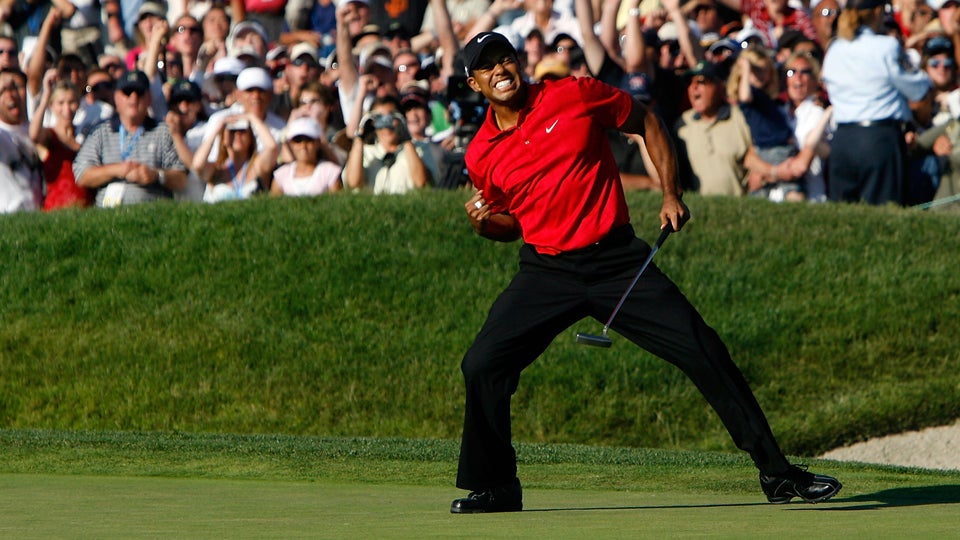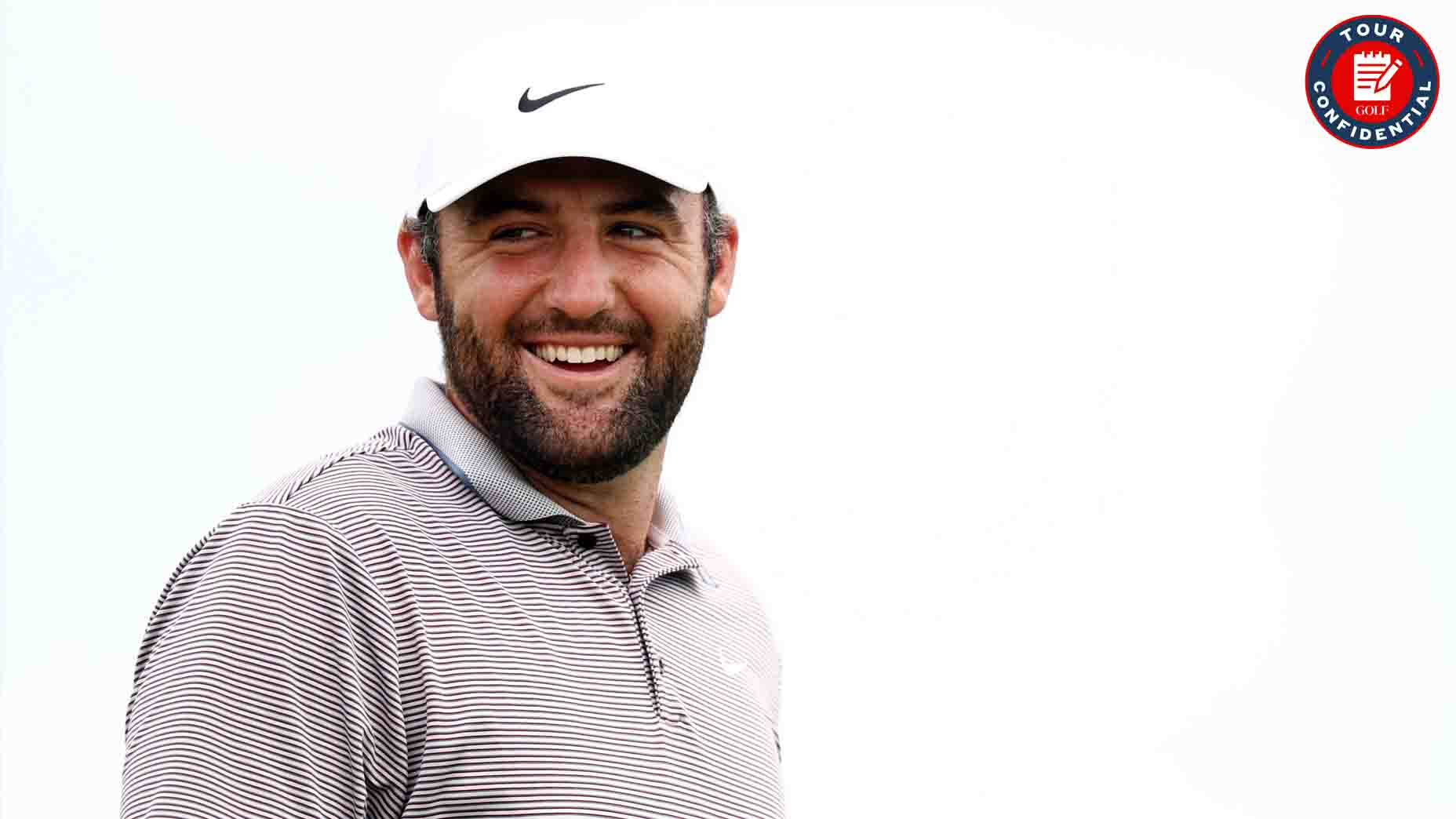The following essay is excerpted from the original manuscript of the author’s book Slaying the Tiger, chronicling a year inside the ropes on the PGA Tour. The paperback version, with a new afterword, comes out Tuesday via Ballantine Books. You can find it in stores, or online here.
“Let’s face it, golfers are pretty spoiled. They’re very spoiled, for the most part. They’ve grown up at a country club, they’ve usually grown up with some money, and they really haven’t had to work for that much in their life. So it’s hard for them to really buy in to college golf, because they’re so used to being an individual, and everything being catered toward them.”
—Josh Gregory, former head golf coach at Southern Methodist University and Augusta State, two-time national champion
A single-minded life isn’t exactly new terrain as far as professional athletes are concerned, but it was still eye-opening to spend a year on the front lines of the PGA Tour and witness just how devoted a golfer must be to his sport—to the exclusion of almost everything else. The player who makes compromises, or who can’t say no to unnecessary demands on his time, is the one who will crack.
“This is not kumbaya anymore,” said Matt Judy, an agent at Blue Giraffe Sports who represents several Tour players. “That buddy of yours from the amateur and junior events wants to kick your teeth in now, and win that $1.5 million. And the guy that’s going to lose his card the quickest is the guy who worries about everybody else.”
MORE MASTERS: Visit GOLF.com’s Masters Hub
He was speaking generally, but in golf there’s a whole lot of truth in the general, and after a year of covering the PGA Tour and interviewing dozens of players, I identified five core qualities that almost every successful golfer has in common: Natural talent, inflated confidence, pathological competitive drive, selfishness, and obsession. Without all five, greatness isn’t just difficult—it’s inconceivable.
1. NATURAL TALENT
The last four elements being equal, which they usually are at the highest levels, talent is what separates the good from the great. Which sounds obvious, but begs the question: Aren’t they all naturally talented? Yes, of course, but there are degrees of native ability, and these degrees make a massive difference.
This is why you have legendary players like Tiger Woods, Phil Mickelson, and Rory McIlroy, who are no more competitive, obsessed, selfish, or confident than any of the other great players on Tour. They’re simply better, and have been since they were six years old. It’s not that they can’t lose—it’s that if everybody plays their best, they stand at the top of the hierarchy. Their best is the best.
The concept is simple, but it can seem tragically unfair to golfers who devote their lives to this pursuit. Every player on Tour is a valedictorian, the proverb goes. They’ve felt like the chosen ones at every step on their way up—best in their town, best in the state, best in juniors, best in college—only to find that at the end of their journey, their reward is someone like Rory McIlroy…who, on a given day, might humiliate them on a golf course.
“It was always comical when parents would call me and go, ‘listen, my kid’s not very good right now, but he’s going to work harder on your team, and I guarantee you he’s going to be helpful,” said Buddy Alexander, the former golf coach at the University of Florida and two-time national champion. “Well, guess what? Justin Leonard and David Duval and Tiger Woods, and so on and so forth, what do they have in common? They were the no. 1 ranked junior in the country. And they’re not going to stop working and give you an opportunity to catch up!”
When pundits talk about a player’s aura, or his intimidation factor, they often fail to cut through the romance and understand that while these celestial qualities may be legitimate, they stem from talent. Tiger Woods may have a fearsome willpower, but willpower without the talent to back it up is useless. When you feel Tiger’s presence as he charges up the leaderboard on a Sunday, it’s not because he gives off a radioactive glow or stands twice as tall as the nearest human—it’s because he has the ability to make a slew of birdies. Only then, when the putts go down, can he tap into that special energy which sets him apart.
In 2014, we saw what happened when Tiger as a force of energy was divorced from Tiger the ethereal golfing talent—he was just another angry mid-level pro hacking his way around the course, trying to forget that his 40th birthday was just around the bend. Everything—everything—begins with talent.

2. INFLATED CONFIDENCE
You could easily rename this “freedom from doubt,” or, if you’re feeling more cynical, “fear of failure.” Josh Gregory went so far as to say that the really great golfers don’t even enjoy winning very much; they just hate losing, and they want to win so they can avoid the negative feelings a loss inspires. (He should know—he coached Patrick Reed.)
That might be a tad extreme, but without self-belief that is all-encompassing—even delusional—a golfer is at an extreme disadvantage. We like to laugh when a player hits a bad approach shot and immediately blames the wind. Or worse, when he stares dumbfounded at a spot on the green where a putt broke the wrong way, or when he yells at a phantom photographer in the crowd after a shank. The truth is, though, it actually helps these golfers to believe that the mistake wasn’t their fault.
Even if the rest of us recognize that they simply made a human error, and even if they might know it on some deep, subconscious level, they can’t admit it to themselves. If they do, that’s called doubt, and in a sport as tenuous as golf, doubt fucks everything up. Doubt makes you question yourself, your swing, and your ability, and the minute there’s even that slightest chink in your mental armor, you’re at risk of a terrible spiral into mediocrity.
This is why the most intellectual golfers—people like Henrik Stenson, Graeme McDowell, Martin Kaymer, and even Rory McIlroy—have gone through elongated slumps in their careers. The brain is a powerful ally, but it can also become a terrible enemy. Players with a self-analytical streak risk punching a hole in the delicate balloon of their confidence, and while talent won’t disappear overnight, self-belief can abandon anyone in a hurry.
You want to be smart, but not so smart that you can’t turn your conscious mind off when it matters. As Matt Every put it, “you have to almost lie to yourself, and then you have to believe the lie.” And the strangest thing about this phenomenon is that great results often tend to follow confidence. If you can fake it, especially to yourself, you can make it. Gregory put it best: To succeed in golf, you need to believe you’re twice as good as you really are. If you believe that, it might actually come true.
(The obvious follow-up question: How do you fool your brain into believing something that you know to be false? Well, if you have to ask that question, you’re too smart already, and you’re destined to spend the rest of your life cursing at the driving range and making your money at honest work.)
[pagebreak]
3. INTENSE COMPETITIVE DRIVE
Nobody succeeds in golf without a pathological competitive drive, and no player sustains his initial success if he becomes complacent. Doug Ferguson, the AP golf writer, once told me a series of stories that perfectly illustrated this concept.
Mike Weir, the 2003 Masters champion, was tied for the lead heading into Sunday of the 2006 Pebble Beach Pro-Am. His co-leader was Arron Oberholser, a golfer who had never won on the PGA Tour. On Saturday, Weir’s post-round comments gave Ferguson the impression that he considered the whole thing wrapped up. Ditto for Robert Garrigus, at the 2012 Canadian Open, when his chief final round competition came in the unremarkable form of Scott Piercy and William McGirt. And when Michael Campbell, the New Zealander who had electrified his home country with a third-place finish at the 1995 British Open, took on a chubby kid named Tim Herron at the next year’s Honda Classic, he was practically condescending, telling reporters that Sunday would be a “good experience” for Herron.
The three leaders—Weir, Garrigus, and Campbell—all had two things in common. First, they believed they were above the fight—that their status, and their prior accomplishments, ensured their victory over some no-name pretender. Second, they all lost.
In contrast, Ferguson remembered Tiger Woods’s 2009 victory at the now-defunct Buick Open, when he entered the fourth round one shot ahead of Michael Letzig and three up on a trio of relative no-names: Roland Thatcher, Greg Chalmers and John Senden. Instead of taking his win for granted, Woods adopted the mindset that if he didn’t play well, one of those players would catch him, and he’d embarrass himself by losing. Tiger won that event, and though it might not register among the most memorable achievements, it’s nevertheless a microcosm of what made him so successful for such a long time—regardless of who he was playing, or where, he never lost the deep desire to win, and he never took victory for granted simply because he was Tiger Woods. He knew that the minute he rested on his name and reputation, the fire would go out and some hungry upstart would catch him.
You can go too far with this kind of thing. Almost every young, established golfer I spoke with told me about a time earlier in their careers when they had spent long hours on the range, desperate to break through, working themselves to the bone and watching their games deteriorate. The phrase they used was “trying too hard,” and the big lesson they had to learn was how to practice efficiently; three sharp hours on the range are worth more than six scattered hours. Competitive drive, they came to understand, was different from sheer work ethic—a donkey can pull a plow from sun-up to sunset, but that doesn’t make him a racehorse.
4. SELFISHNESS
As for the next element, selfishness, remember that every interaction in a golfer’s life—with media, fans, sponsors, agents, and even family—revolves around him. He is always the center of attention, and that is a skewed way to live a human life. To quote Morrissey, this fatal fame “can play hideous tricks on the brain.” But in many cases, no corruption is necessary—the country club kids have lived most of their lives in a cocoon of privilege, and their only focus, from a very young age, has been to succeed at golf. They’ve been self-involved from the beginning, and the sad truth here is that a lifetime of unwavering selfishness prepares them well for success amid the circus of Tour life.
There are people surrounding them at all times that can bolster their career, but those same people can be a serious hindrance if the golfer fails to crack the whip. The agent keeps him on schedule, the journalist publicizes his efforts on the course, the wife or girlfriend makes sure his home life is comfortable, sponsors ensure he has the best clothes and equipment, and at the bottom of the pyramid, fans with money make the whole scene viable. But the agent who schedules too many public appearances for quick cash grabs, or the journalists who take advantage of the player’s inability to say no, or the wife who isn’t interested in playing the traditional homemaker role in exchange for a posh life, or the sponsor who demands too much time at brainless corporate events, or the fans who tweet that he’s an epic asshole when he fails to sign an autograph…all of these forces can detract from the one component that keeps the golfer afloat: His game.
For that reason, any player who wants to maintain his focus has to operate with an intelligent kind of selfishness, and insist on having things his way all the time. The ones who do it best are benevolent dictators, and the ones who can’t fall under the control of someone smarter—usually an agent—and live with the passive hope that they won’t be exploited.
This selfishness extends to home life, where “focused relaxation” is a key component to prolonged success. Almost every golfer I spoke with had the same off-the-course passions—hunting, fishing, boating, watching sports, buying expensive toys. Things that engage the brain, but only slightly. In fact, there’s not a lot of time for secondary interests, which is why you get the common stereotype that golfers are boring. There aren’t a lot of readers on Tour—Jason Day admitted in April that he had only read two books in his lifetime, which is twice as many as Ian Poulter copped to (unless Poulter read his own “autobiography,” which is possible since it covers his favorite subject).
And despite the fact that they travel all over the country, and the world, most golfers never stray very far from the course and the hotel. Bubba’s famous display of cultural ignorance in France was by far the most public exhibition of a golfer’s insularity, but it’s not unique—these guys couldn’t give a shit about the Eiffel Tower. It’s even rare for a group of golfers to go out and have a drink together—when I spoke to Jonas Blixt, he lamented the fact that everyone on Tour stays within their inner circle, aka the Golf Posse, and there’s almost no social interaction between players. (On the European Tour, with its smaller purses, most players don’t make enough money to travel with their entourages and families, and friendly post-round get-togethers are far more common.)
Politics, too, follows directly from this selfish mindset. The mystery of why golfers are so adamantly conservative, despite not being very well-read or even especially aware of their political surroundings, is easily solved: The way they live their lives makes them totally incapable of imagining an existence outside their own, and so they become single-issue thinkers. The party that takes less of their money through taxation is the party they’ll support, and any argument that taxes benefit the less fortunate—or bolster a country that has made their historically anomalous lifestyles possible—is an abstraction they’ve been conditioned not to notice.
To get back to the racehorse metaphor, asking the average golfer to comprehend a problem like poverty is like asking a thoroughbred with blinders to care about a deadly earthquake in Mozambique.
p>
5. OBSESSION
Obsession, the final ingredient, speaks for itself. Players who can spend endless hours, days, and years on the range, without becoming bored or discouraged, are the ones who become good enough to attempt a professional career—even if they eventually have to learn to channel the obsession. Most pros had dreams in their youth of winning tournaments and becoming famous, but the dreams weren’t their primary motivation. Beneath it all was a fixation on golf that we often call “love,” but is better described as infatuation or mania—a kind of relentless devotion that, if applied to an actual romantic relationship, would end with a restraining order.
Like selfishness, though, this mental “mutation” proves adaptive—without it, you can forget your dream of reaching the highest levels, because somewhere out there in the sprawling American landscape, or across the Atlantic Ocean in Europe, or in South Africa or Japan or Korea or Argentina, you can bet that a future rival is working himself to the bone at the exact moment when you give in to the comfortable allure of being a normal kid.
The demands golf makes on a player attract a certain peculiar kind of specimen—one who likes being alone, and one who may be a little mentally off-kilter to begin with. While golfers may be boring in the sense of how they live their lives, they are a writhing mixed bag of dysfunction in the brain. And as you might imagine, there’s a flip side to obsession, and it can get ugly.
What forms does this take? All players experience anxiety, since golf is a nervous sport that can heighten the quirks and tics already present in the psyche, but some players go above and beyond. In 2013, Cameron Morfit wrote for GOLF magazine about the litany of golfers who suffer from some variety of ADD or ADHD, including Poulter, Bubba Watson, Robert Garrigus, Payne Stewart, and many more. These are the jittery types who could never sit still in school, and who need some degree of steady stimulation to function normally.
Then there’s the set who exhibit characteristics of OCD. Sergio Garcia, for instance, spent the early part of his career afflicted with the “waggle yips” as he raised and lowered his club over the ball up to 20 times before he could take a swing. The worst offender today is Keegan Bradley, whose tics and rituals make Garcia look like an efficient robot by comparison.
Other mental hang-ups have no scientific name. Kevin Na and Robert Karlsson both went through periods where some mental block kept them from taking the club back, which led Karlsson to withdraw from a tournament and Na to repeatedly miss the ball on purpose on the tee so he could start his routine over without taking a penalty.
The instances can get darker, too, and have less connection to the game itself. Charlie Beljan once had an anxiety attack during the second round of a tournament, forcing him to sit on the fairway on several holes because he thought he was experiencing a heart attack. After finishing with a 64, he left the course in an ambulance…and returned on the weekend to win the tournament. He continues to suffer from anxiety, and can’t even contemplate eating most foods, but he’s able to function in day-to-day life.
That wasn’t always true for Steven Bowditch, another Australian who came through the Kooralbyn School that boasts Day and Scott as alums. In 2009, he told Golf Digest’s Jim Moriarty that he had long from clinical depression. It came to a head in 2005 while playing the Nationwide Tour, when he began to binge drink, staying up all night even when he had a morning tee time. He left his room only to golf, and his behavior began to grow bizarre; he’d drive for hours with no purpose, or lose focus in the middle of rounds and wander off the course. Amazingly, he earned his PGA Tour card in the midst of this, but on Tour in 2006 his psyche shattered. He wept openly on the golf course, broke off contact with his family and friends for months at a time, and had to withdraw from tournaments because he couldn’t force himself out of bed. He became a punch line to certain pundits who had no idea what he was enduring.
As things grew worse, he alternated between emotional extremes and used alcohol to turn off his brain. Finally, his mind began racing to such an extent that he went 12 nights without sleep. In a last-ditch attempt to knock himself out, he drank a bottle and a half of Scotch in an hour. He slept for two days, but when he woke up and still felt terrible, he put on several layers of clothes and tried to kill himself by jumping in the swimming pool outside his condo. All that kept him from death was his girlfriend, who found him in the water and rushed him to the hospital.
After a period of trial and error with antidepressants, Bowditch began to recover, and by 2014 he was good enough to win the Valero Texas Open with a healthy brain. He has no desire to speak about his depression anymore, but he did make a seven-minute video for Beyond Blue, an Australian initiative formed to help those who suffer from depression and anxiety. With tears in his eyes, he spoke about his worst moments, when he couldn’t reconcile how he felt, day after day, with the ideal of the “Queensland male,” who is supposed to be tough and self-sufficient, and who scoffs at new-age palliatives like talk therapy and pills. He was even grateful to be diagnosed with depression, at first, since it wasn’t the deadly cancer he had feared. Before long, he realized that he was in for the battle of his life. In those darkest days, it’s hard to imagine that he could see a future, almost a decade down the line, where he could find peace, and where he was a winner on the PGA Tour.







